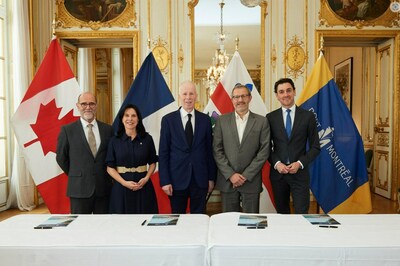
MONTREAL, April 28, 2023 /CNW/ – Meeting at the Canadian Embassy in Paris on an official mission, President and Chief Executive Officer of the Montreal Port Authority (MPA) Martin Imbleau and Montreal Mayor Valérie Plante signed the Worldwide Network of Port Cities (AIVP) Agenda 2030. Through this commitment, the City of Montreal and the Port of Montreal strengthen their determination as a port city to jointly implement the United Nations Sustainable Development Goals.

An ambitious agenda
Created in 1998, the Worldwide Network of Port Cities aims to improve city-port relations to achieve urban, port and economic development that is more sustainable, responsible and innovative. To help port cities steer their way through this process, the AIVP 2030 Agenda sets 10 goals to be achieved by 2030 based on the UN’s 17 Sustainable Development Goals. This course of action invites port-city stakeholders to experiment with innovative solutions on such issues as adapting to climate change, energy transition, sustainable mobility, port culture and identity, the city-port interface and protecting biodiversity. In this way, the AIVP 2030 Agenda aims to strengthen the city-port relationship through mutual cooperation that places citizens at the heart of its efforts.
“The City and the Port of Montreal share a common purpose and a vision for the future based on sustainable land use planning, decarbonization, improving the city-port interface and opening up to citizens. The collaboration between these two entities is all the more natural because it is part of our converging strategies. Thanks to AIVP 2030 Agenda, I am certain that we will succeed not only in strengthening Montreal’s assets as a major port city, but also in rethinking the urban space in light of best practices,” said Martin Imbleau, President and Chief Executive Officer of the MPA.
“I am very proud to enhance collaboration between the City and the Port of Montreal through the signing of the AIVP 2030 Agenda. Port operations are essential to the city’s economic development. By implementing the goals in the 2030 Agenda, the City and the Port will be able to keep working to make these operations greener, more sustainable, and better integrated into the surrounding urban fabric,” said Valérie Plante, Mayor of Montréal.A shared vision
AIVP members since 2022 and 1993 respectively, the City of Montreal and the MPA had already been working together for several years to achieve the goals set out in the 2030 Agenda.
The joint signing of the Agenda 2030 by the MPA and the City of Montreal will make it possible to strengthen the collaboration and joint projects between both institutions. The City of Montreal and the Port of Montreal are already working together through a liaison committee on several matters, such as the city-port interface, promoting maritime culture, protecting biodiversity, cohabiting with neighbouring communities and adapting to climate change. The Port of Montreal has also pledged to invest $10 million, or 1.5% of its budget, in the city-port interface on projects that will improve the positive social impact of port activities for the benefit of communities near its facilities.
As a result, this commitment will promote sustainable growth and harmonious cohabitation with port activities while contributing to the city’s economic competitiveness and energy transition.About the Port of Montreal
Operated by the Montreal Port Authority (MPA), the Port of Montreal is the second largest port in Canada and a diversified transshipment centre that handles all types of goods: containerized and non-containerized cargo, liquid bulk and dry bulk. The only container port in Quebec, it is a destination port served by the largest shipping lines in the world. It is also an intermodal hub with a service offering that is unique in North America, featuring its own rail network directly dockside connected to Canada’s two national rail networks. The MPA also operates a Cruise Terminal and a Port Centre.
The MPA factors economic, social and environmental components into its corporate initiatives. This commitment is governed by a sustainable development policy whose guiding principles focus on involvement, cooperation and accountability. Port activity supports 19,000 jobs and generates $2.6 billion in economic benefits annually.

SOURCE Montreal Port Authority

Back | Next story: AFRICA OIL ANNOUNCES FURTHER INVESTMENT IN IMPACT OIL & GAS AND SHARE CAPITAL AND VOTING RIGHTS UPDATE